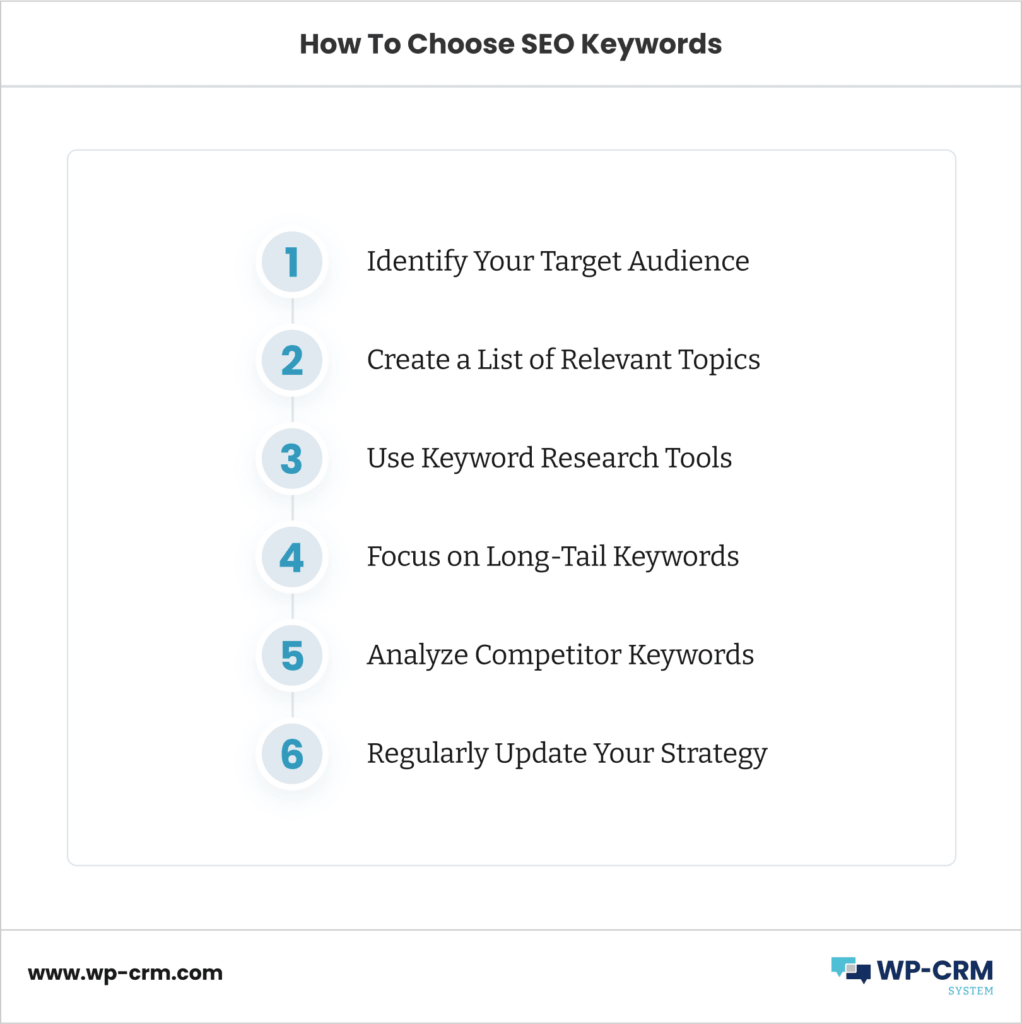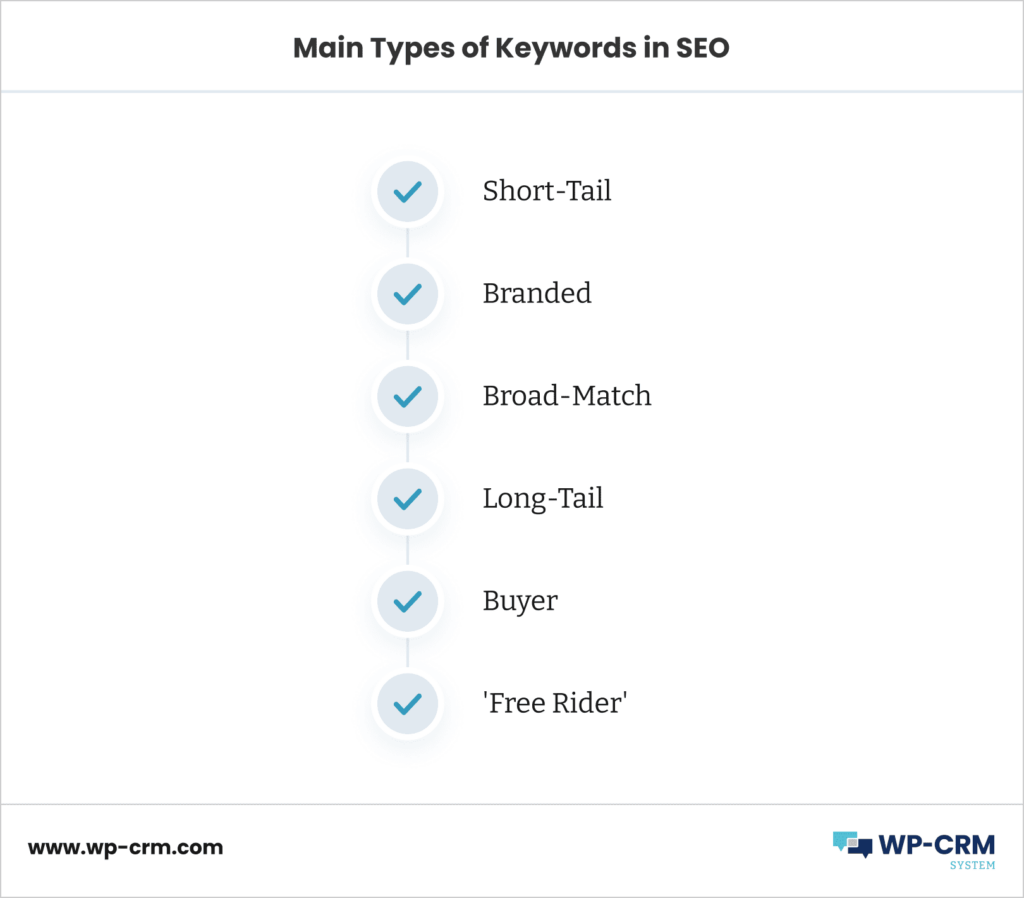7 Types of SEO Keywords Important For Your Site Performance
SEO keywords come in different shapes and sizes depending on what you hope to achieve with your website and SEO strategy. Maybe you just started a blog, or you decided to revive it after a long pause? In this case, you just want to attract eyeballs to get visible on Google. So, target generic, long-tail keywords that aim for users with informational or navigational intent.
Perhaps you want to increase your conversions and boost sales of your product or service? Although the SEO keywords you optimize for in this scenario will be quite similar to the former, they will have to target individuals ready for the next step and take action. So, target search phrases that contain transactional words like ‘buy’, ‘deals’, ‘discounts’, etc.
The types of SEO keywords you optimize your WordPress website for need to be aligned with the search intent of your audience personas. It is important to also keep a close eye on competitors’ keywords, especially if your business is in a ‘crowded’ industry. But first, let us clear the sky above the 7 main different types of SEO keywords and help you make out the differences between them!
What Are SEO Keywords?
SEO keywords are the words and phrases that individuals type into search engines when looking for a specific product, or just for a piece of information. Businesses use them in their website content as a way to attract potential customers, improve their search engine ranking, and increase their online visibility.
When creating website content, including blog posts, product descriptions, and service pages, it’s essential to conduct thorough research to identify relevant SEO keywords that align with your business’s offerings. Ultimately, this can help boost your website’s organic search traffic and lead to increased sales and business growth.
How To Choose SEO Keywords?
Choosing the right SEO keywords is crucial for the success of any online business. Here are some steps to help you out.

Identify Your Target Audience
Knowing who your target audience is is the first step in determining the right SEO keywords. Ask yourself the following questions:
- Who is your ideal customer?
- What are their age, gender, and geographic location?
- What are their interests and pain points?
- What language do they use to search for products or services similar to yours?
Create a List of Relevant Topics
Make a list of topics that are relevant to your business and industry. Use them to generate keyword ideas. For example, if you own a coffee shop, some relevant topics may be different types of coffee, brewing techniques, recipes, etc.
Use Keyword Research Tools
Keyword research tools like Google Keyword Planner, SEMrush, and Ahrefs can help you identify relevant and popular search phrases. These tools provide data on search volume, competitiveness, and related search terms to help you choose the best keywords for your business.
Focus on Long-Tail Keywords
Long-tail keywords are more specific and have less competition than short-tail keywords. For example, “coffee shop in San Francisco” is a long-tail keyword, whereas “coffee shop” is a short-tail keyword. Using long-tail keywords can help you target a specific audience and improve your chances of ranking higher in search engine results. But more on this later!
Analyze Competitor Keywords
Analyze the keywords that your competitors rank for. Tools like SEMrush can help you identify the keywords that are driving traffic to their website. Use this information to generate new keyword ideas or to validate the keywords you have already selected.
Regularly Review and Update Your Keyword Strategy
Finally, regularly review and update your keyword strategy to ensure that you are on the right track. Consumer behavior changes over time, so it’s important to stay up to date with the latest trends and adjust your strategy accordingly.
How Many Types of Keywords in SEO Are There?

Short-Tail Keywords
Short-tail keywords, also known as generic or seed keywords, are typically one or two words long and have a broad meaning. These keywords are often highly competitive and bring in a high volume of traffic. However, they are also less specific and may not lead to high conversion rates.
Examples of short-tail keywords include:
- Website development
- Mobile phones
- Hotels
Branded keywords are typically less competitive than short-tail keywords, and they often have high conversion rates. By targeting branded keywords, businesses can capture the attention of their target audience and increase their conversion rates.
Broad-Match Keywords (Commercial)
Broad-match keywords, also known as commercial, are typically three or more words long and are more specific than short-tail keywords. They are often used by businesses that provide a wide range of products or services.
Examples of broad-match keywords include:
- Best WordPress development agencies
- Most comfortable running shoes
- Affordable hotels in London
Broad-match keywords are highly targeted and can bring in highly specific traffic. However, they may also be more competitive than short-tail keywords, which can make it harder to rank for them.
Long-Tail Keywords
Long-tail keywords are highly specific search terms that are typically more than three words long. These keywords are often lower in search volume, but they are also less competitive and have higher conversion rates.
Examples of long-tail keywords include:
- Best WordPress development agencies in Bulgaria
- Most comfortable running shoes for flat feet
- Affordable boutique hotels in London
Long-tail keywords are ideal for businesses looking to attract highly targeted traffic. By using more specific keywords, businesses can attract customers who are closer to the end of the buying cycle and are more likely to make a purchase.
Buyer (‘Money’, or Transactional) Keywords
Buyer keywords, also known as ‘money’ or transactional keywords, are search terms that show the intent to purchase a product or service. These keywords are highly targeted and typically have high conversion rates.
Examples of buyer keywords include:
- Hire a WordPress development agency
- Buy running shoes online
- Book a hotel room in Paris
By targeting buyer keywords, businesses can attract customers who are ready to make a purchase, which can lead to increased sales and revenue.
‘Free Rider’ Keywords
‘Free Rider’ keywords are the complete opposite of transactional searches. They are usually used by individuals who are looking for freebies, or just for tutorials, like the following examples:
- Learn to build a WordPress website yourself
- Tips for running a marathon
- How to live in London rent-free
‘Free Rider’ keywords can be a great way to attract significant traffic to a website. By providing useful information to visitors, businesses can build trust and establish themselves as an authority in their industry. However, keep in mind that most of the visitors that land on your website using this type of search query are highly unlikely to convert. So, if you are hoping to get more clients with SEO, channel your efforts towards a mix of commercial, transactional and long-tail.
Wrapping Up
Taking the initiative to understand how to use SEO keywords in your website, blog posts and digital content can do wonders for your website performance. Knowing the basics of keyword types and where and how to use them will also give you a competitive edge, as you will be able to create more effective content that engages your target audience.
